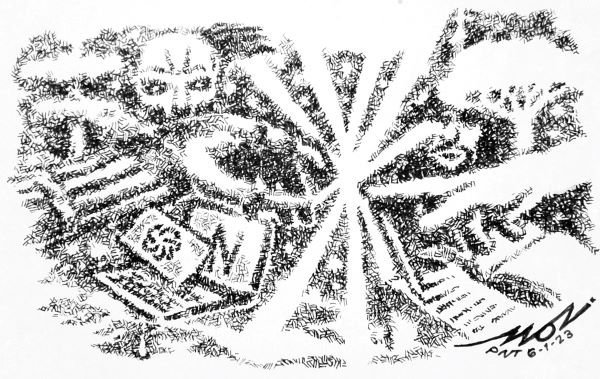When I became an adult in the 1980s, the farthest we went in terms of entrusting our lives with
machines was the credit card, and even then, our payment went through a credit card imprinter
and you would get a carbon copy using those black–inked sheets that go in between sheets of
paper to mark the ones underneath the original document. Back then, a credit card meant a
certain status, and if you had one, you were a member of the elite class, paying with plastic,
unlike the poor who still had to count their change to buy a bottle of pop put in a plastic bag with
a plastic straw. Working in Makati and eating out of plastic bags from our own version of the
food truck back then meant I did not own a credit card, and in retrospect, I would say they were
the best of times.
Fast forward thirty years later in Canada, we were told once we landed as immigrants that we
had to possess credit cards in order to build a credit history, otherwise we wouldn’t be able to do
banking or take out a loan for a car or house. Once that was accomplished, we were still very
careful to trust purchases through plastic, as we didn’t want to go overboard with spending and
a few more years later came online banking, online shopping, online doctor consultation and
medical test results retrieval, Facebook, Twitter, Amazon and everything else that now
possessed our information, ready to be swiped by any vendor, hacker or practically anyone in
the world.
Our medical records because of COVID immunizations are now exposed to everyone as well,
and our identities are now all in a moshpit of other peoples’ information, now more available to
artificial intelligence. Of course, through the last fifty or so years, we have already surrendered
our identities to AI in many forms, unless you have been hiding under a rock where you have
been living and where you have not seen a computer or required a WiFi signal. In the recent
months, AI has been ramping up with the launch of the ChatGPTs, or Chat Generative Pre–
Trained Transformer that was developed by an AI research company, Open AI. It is an artificial
intelligence chatbot technology that can process our natural human language and generate a
response by gathering as much materials as it can, put it in a word salad mixer, and spew out
information that looks credible enough to publish. Right now, educators are being encouraged to
use it, as well as lawyers and bankers. The medical world has been using AI in many ways but
not for doctors to use as an aid to diagnose. The rapidly expanding use of AI in many fields has
people wondering, “To what extent can we trust it?”
The answer lies in the question, “Do you still believe in humanity?” While technology is good,
there’s just many things AI cannot have. Feelings for instance. Sentimentality, zeal, fervour,
love, compassion, desire – name a human emotion and AI will never possess it.
That’s where we have to draw the line. When we invented computers in the 1940s, its purpose
lay in the name itself – to compute. Big numbers. That’s what it was developed for. Today,
however, it is being used to match couples through online dating, unlike in the past when people
had to actually meet in person to see if they actually can give relationships a chance. It is also
being used to create poetry, unlike in the past when writers and poets evoked their emotions to
deliver a message. For some people, it used to develop an analysis of problems, unlike in the
past where we relied on the expertise of professionals to diagnose and troubleshoot to remedy
a problem. Where human ideas, emotions, instincts and logic are necessary, AI will never
deliver, so if we put our trust too much in it, we may lose our humanity in the guise of efficiency.
We will lose sight of the fact that being human is messy, inaccurate and is a journey of trial and
error. That’s what makes us human.
Humans have already given up much of their lives to AI through our daily existence, and it is
important for us to know that human relationships and man’s relationship with God cannot be
two of them.








